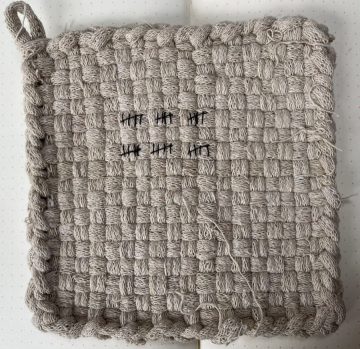
Source: LHarding
Seminar on the 9 January 2024
Entanglements: Practice As Research and “thinking-with” in prison education research.
In this seminar, Lucy Harding discusses her material, creative, activist research of prison education spaces.
Lucy Harding has used several creative methods throughout her research of prison education spaces. This includes informally thinking-with drawing, weave, and stitch and more formally researching with walking interviews, a ‘visual matrix’ method (Froggett, Manley & Roy, 2015) together with diffractive analysis. Each time she has chosen these methods, it has also been a conscious choice to be-with the data and ideas materially, where she takes inspiration from Erin Manning and calls on her intuition as a craft of research (Bell & Wilmott, 2020). But it has also been due to an innate ‘feeling’ to explore new ways, to delve deeper into affective responses, in an activist stance against the ‘academicwritingmachine’ (Henderson, Honan and Loch, 2016).
There is joy in being creative but there is angst and fear in the sharing this activism with others, especially when working with political bodies such as the prison service. This is when the discomfort hits. She then goes through a process of questioning the methodology, the material choices, the philosophy behind and in between the outcomes. In this seminar she will share how it felt to push past these feelings of discomfort and ‘stay with the trouble’ (Haraway, 2016).
Lucy Harding holds the position of Senior Educationalist at the Royal College of Physicians whilst also pursuing her doctoral studies at the University of Central Lancashire. With a career in education for over two decades, she initially specialised in creative disciplines such as textiles and fashion. Her professional journey led her to be a programme leader of teacher education followed by an educational management role in a male prison.
Working within the confines of prison environments has profoundly influenced her perspective of challenging teaching in the periphery of the education sector. Her research focus centres on understanding the affective experiences of teachers working in demanding and often traumatic settings. In her research methodology, she employs innovative approaches, incorporating creative elements such as drawing, weaving and stitchwork as integral components of data collection and postqualitative inquiry. This unique approach allows her to perceive phenomena in new and different ways.
Subscribe to the recordings:
Video hosted on the PAR YouTube channel.
Audio hosted on the PAR Buzzsprout channel and can be listened to on Spotify, Apple podcasts or on other RSS podcast apps.
The Practice As Research network with its resources is free and always will be, but it does of course incur costs to run and to keep it running. If you use it and benefit, enjoy it and would like to keep it going, please, consider leaving something in the tip jar. Thank you!